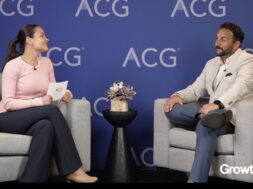Building a Diverse Talent Network in Private Equity
GTCR’s Melissa Mounce Mithal bolsters executive talent for investment success

Melissa Mounce Mithal was recruited into private equity at 30,000 feet.
A decade ago, on a flight from Chicago to San Diego, she happened to sit next to a private equity partner looking to add a human capital leader to his firm’s team. Although Mounce Mithal, who at the time was leading global talent acquisition at healthcare company Abbott, was intrigued by the opportunity, she didn’t know if anything would come from their in-flight conversation.
This section of the report originally appeared in the Fall 2023 edition of Middle Market Executive.
Photography by John Boehm.
But it did. After nearly two decades in professional services, Mounce Mithal took a role at private equity firm Baird Capital as its first human capital operating partner, a position she held for five years. “At the time, the human capital role was a very new one in private equity,” says Mounce Mithal. “Focusing on talent to bring about investment success was an emerging strategy, and it was an exciting opportunity to shape a new position.”
Today, Mounce Mithal is the managing director of leadership talent and diversity at Chicago-based private equity firm GTCR, which she joined in 2019.
“Private equity is my third career incarnation,” says Mounce Mithal. She started out in corporate strategy at Motorola before moving on to professional services, where she was a business transformation consultant and people operations leader at EY and then a client services manager at Aon, leading global operations for the recruitment process outsourcing business. The role at GTCR was appealing not only because of the firm’s marquee brand but also because the average size of its portfolio companies was larger, making it more analogous to the work she’d done as a consultant and with clients in her corporate roles.
Embodying the “Leaders Strategy”
She’s a very humble leader and an excellent facilitator. She makes sure no one voice dominates the conversation and that everyone has the opportunity to speak.
Jay Boykin
Gogo Business Aviation
GTCR was also an appealing next step for Mounce Mithal due to the firm’s strongly held belief in the importance of talent. GTCR’s Leaders Strategy, which focuses on sourcing and creating partnerships with management leaders, has been a differentiator for the firm for over 40 years. “Talent is core to GTCR. I knew if I took this role, I wouldn’t have to work to establish why talent was important—it is and has always been a foundational philosophy for the firm, and that was extremely attractive to me,” says Mounce Mithal.
While Mounce Mithal oversees GTCR’s network of executive relationships, “maintaining these relationships is very much a shared responsibility at the firm,” she says. This is one way in which the firm builds a deep bench of qualified candidates for board directors, advisors, operators and other executives. Everyone at GTCR is expected to know who the experts in their investment sectors are, integrate themselves with those executives and research those areas regularly.
Cultivating trust between GTCR and its portfolio companies is key to the Leaders Strategy’s success, and from all accounts, Mounce Mithal excels in this regard. “Melissa and the rest of the GTCR team are excellent at supporting portfolio companies without dictating,” says Jim Henderson, the chairman and CEO of insurance agency AssuredPartners, a GTCR portfolio company. Henderson has worked with Mounce Mithal’s team on numerous initiatives, including identifying a new HR executive for AssuredPartners; crafting a succession plan; and incorporating diversity, equity and inclusion (DEI) practices into the company’s hiring process. “Melissa and her team advise us, but there’s a lot of autonomy involved—they would never tell us who to hire or even how to hire them. Instead, they help provide us with a blueprint of different candidates’ strengths and weaknesses and make sure we have a team around us to fill in any gaps or address any potential issues.”
Related content: More Than Lip Service: DEI in Private Equity
 Mounce Mithal makes use of her background in HR and talent acquisition to foster communication and collaboration among the HR leaders at GTCR’s 37 portfolio companies. The firm’s annual Human Capital Summit, hosted at its Chicago office, is a daylong event and dinner featuring trending topics, workshops, guest speakers and networking. “We continue the collaboration and momentum throughout the year with quarterly virtual sessions,” says Mounce Mithal, and all the HR executives are also connected on an online collaboration platform.
Mounce Mithal makes use of her background in HR and talent acquisition to foster communication and collaboration among the HR leaders at GTCR’s 37 portfolio companies. The firm’s annual Human Capital Summit, hosted at its Chicago office, is a daylong event and dinner featuring trending topics, workshops, guest speakers and networking. “We continue the collaboration and momentum throughout the year with quarterly virtual sessions,” says Mounce Mithal, and all the HR executives are also connected on an online collaboration platform.
“Exposure to other companies’ strategies is so incredibly valuable and provides an opportunity to learn from others’ successes and mistakes to guide our own experience,” says Henderson. “Melissa drives these symposiums with excellent leadership skills and good energy, and makes everyone feel comfortable.”
Mounce Mithal’s humility and facilitation skills stand out. “We’ve all been at an event where it’s clear the organizer is just trying to shine the light on themselves. Melissa does not do this at all,” says Jay Boykin, the vice president of finance transformation and diversity, equity and inclusion at GTCR portfolio company Gogo Business Aviation. “She’s a very humble leader and an excellent facilitator. She makes sure no one voice dominates the conversation and that everyone has the opportunity to speak.”
Doubling Down on Diversity
The pandemic hit a year into Mounce Mithal’s tenure at GTCR. In a time of uncertainty, when no one was traveling and many deals were stalled, Mounce Mithal decided to focus on cultivating diversity in GTCR’s executive network. “Executive accessibility was at an all-time high.
As a firm, we saw this as an opportunity to double down on ensuring that we were building diverse talent pools in our executive network,” says Mounce Mithal. GTCR used Zoom and online networking tools to build relationships with diverse candidates. “It was highly proactive work and has really paid off in terms of being able to place executives whom we first connected with over Zoom,” says Mounce Mithal.
To help expand GTCR’s network of female executives, as well as support those currently in its network, Mounce Mithal developed a partnership between her firm and Extraordinary Women on Boards (EWOB), an organization that aims to raise the presence and influence of women in the boardroom. “From the moment we met Melissa, we were inspired by her versatility and agility—she comes from a background that goes well beyond HR and includes operations and lots of other experiences that make her a very strategic thinker,” says Lisa Shalett, a former Goldman Sachs partner who co-founded EWOB with former financial services executive Lisa DeCarlo.
GTCR looks to EWOB’s more than 700 members as potential candidates for portfolio companies’ boards. The firm also sponsors memberships to EWOB for its portfolio companies’ female board members. This year, there are 29 female directors benefiting. Overall, GTCR has prioritized creating a community for its women directors. In partnership with EWOB, the firm held an inaugural in-person summit for female directors in May and plans to host several virtual events and in-person dinners throughout the year. GTCR also provides a collaboration platform to allow everyone to interact virtually on a regular basis.
“We’ve worked with Melissa and GTCR’s CFO, Anna May Trala, to create a community within a community, enabling Melissa as well as the GTCR directors to get a lot of feedback, strengthen relationships and create a real sense of mutual respect and connectivity. It’s an initiative that really sets GTCR apart,” says Shalett.
“It’s so helpful to meet people having similar experiences as you are, and compare and share skill sets,” says Vicki Dudley, a board member at GTCR portfolio company Cisive. In addition to the in-person events, EWOB’s content, which features relevant news articles and opportunities to connect with other female board members, is also very valuable, says Dudley. “There are not a lot of women in private equity, and Melissa’s efforts certainly go a long way toward helping the women who are there feel more comfortable, while making space for more to enter the industry,” she notes.
Mounce Mithal’s team has also created a DEI learning series to empower and encourage diversity within the executive ranks of GTCR’s portfolio companies. The series brings together human resources leaders and executives focused on DEI efforts at GTCR portfolio companies, both virtually and in person.
“We talk about best practices, what’s working and what’s not, and ideas for things we can do to promote DEI in our various companies. It’s a good opportunity for us to share ideas in a very collaborative environment,” says Gogo Business Aviation’s Boykin. Gogo Business Aviation’s CEO is a signatory of the CEO Action Pledge for Diversity and Inclusion, as is GTCR itself and 84% of its portfolio companies. The learning series centers around the four pillars of the CEO Action Pledge, which include cultivating environments that support open dialogue on complex conversations around DEI, implementing and expanding unconscious bias education and training, sharing successful and unsuccessful DEI programs and engaging boards of directors when developing and evaluating DEI strategies.
Related content: Portfolio Company CEOs Are Focused on DEI, but Lack a Clear Path Forward
The private equity industry is often criticized for its lack of diversity, and Mounce Mithal and her team recognize that it’s important to turn their gaze inward as well as outward toward their portfolio companies. Mounce Mithal and Trala lead GTCR’s own DEI council, which consists of a cross-section of 20 firm employees. “The counsel was the first to go through a DEI upskilling program, which we then rolled out to the broader leadership and the rest of the firm,” says Mounce Mithal. “We’re focused on our own DEI journey and on creating an inclusive culture within our firm, as well as our portfolio companies.” Currently, 84% of GTCR portfolio companies have at least one diverse board member, and 42% have at least two.
The Challenges of Changemaking in PE
One of the biggest challenges of transitioning from working in corporate and professional services environments to private equity was adapting to the industry’s long-term outlook, says Mounce Mithal. “The timeline is just different. In professional services, you’re very project-and deliverable-focused. That carries into private equity, but the cadence is different.” Being able to balance the long-term vision for multiple portfolio companies, as well as for GTCR itself, over the long term requires a keen sense of prioritization and balance.
Mounce Mithal’s past few years at GTCR have been volatile ones for the industry. “It’s still a highly competitive talent environment. There have been a lot of shifts within the market in the past few years—finding up-and-coming executive talent is key right now as we see many executives retiring or opting out for lifestyle reasons,” Mounce Mithal says. “Executives are really smart about the opportunities out there and who they want to partner with. There’s a lot of scrutiny all around.”
GTCR looks for investments in financial services and technology; healthcare; technology, media and telecommunications; and business and consumer services. One way in which the firm has expanded its executive talent pool is by seeking individuals, particularly in technology, who might be able to work in a different industry from the one they’re currently in. “It’s not true in all cases, but often if we find great tech talent, it may not matter if they come from a slightly different industry,” says Mounce Mithal.
On a broader level, there’s also an inherent tension that comes from being the changemaker in a private equity environment. “I can tell you from having been in an innovation role in a private equity firm in the past, it’s hard to drive change when things are going well,” says EWOB’s Shalett. “Every organization has its own culture which has to be respected. Melissa is exceptional in this regard. She has a knack for putting together a very thoughtful plan, making it relevant and persuasive, and driving it through.”
Meghan Daniels is a freelance writer and editor based in Dutchess County, New York.
Middle Market Growth is produced by the Association for Corporate Growth. To learn more about the organization and how to become a member, visit www.acg.org.


